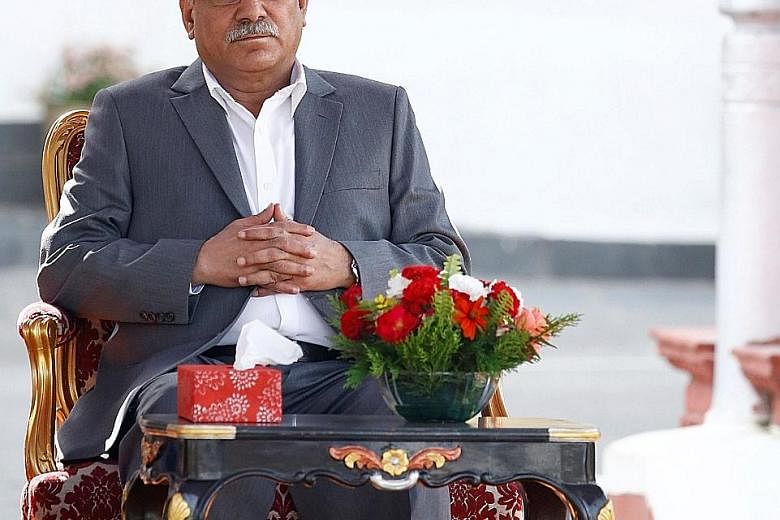Nepal's new prime minister Pushpa Kamal Dahal has not had a typical political career, having led an armed insurgency in the jungles for as long as he has been a politician.
Yet Mr Dahal - who has transitioned from a Maoist rebel to a politician over the past decade - faces perhaps one of his biggest political tests as he takes charge of the country amid political instability and slowing economic growth, pegged at 1.5 per cent this year.
More popularly known as Prachanda, which means "the fierce one", Mr Dahal was elected prime minister last Wednesday. This is his second stint in the job.
The 61-year-old replaced Mr Khadga Prasad Sharma Oli, who resigned last month to avoid a no-confidence vote, after he struck a power-sharing deal with one-time rival the Nepali Congress.
Under the deal, Mr Dahal will hold the post for nine months before handing over to Nepali Congress president Sher Bahadur Deuba, who back in 2001 had set a 5 million rupee (S$63,000) bounty for Mr Dahal's capture.
Known as a pragmatist and realist, the portly, moustached Mr Dahal takes over at a time when public anger has been growing against a political class that has continued to squabble over power and ministerial berths. Nepal has had nine prime ministers in eight years.
"People in Nepal are desperate to see change. Earlier when he (Mr Dahal) came into politics, people thought this man was going to do something. There was a euphoria. This time round there isn't. People don't distinguish him as being different from any other politician now," said Nepalese daily Nagarik's editor-in-chief Guna Raj Luitel.
"The situation in Nepal is not easy for him because he needs to bring all the political forces together. He comes to power with more challenges than opportunities."
Born in the Annapurna region to a lower middle-class family, Mr Dahal earned a degree in agriculture from Nepal's Institute of Agriculture and Animal Science and was a school teacher for four years. Influenced by leftist ideology, he entered politics at 25 and joined the Communist Party of Nepal (Maoist). Rising through the ranks, he launched an armed rebellion in 1996 to end social inequities and to overthrow the monarchy
Charismatic and a keen military strategist, he was able to inspire hundreds to join the armed insurgency and successfully led the Maoist army to capture large swathes of land in Nepal. More than 13,000 people died in the civil war, which ended following a 2006 peace agreement between the then government and the Maoists.
Mr Dahal, a father of four, played a crucial role in Nepal's transition after the fall of the monarchy to a republic. Within two years of the peace agreement, he swept to power on a wave of popularity as people saw him as a politician with a difference. But the political novice was unable to hold on to power. He resigned over his failed bid to sack the army chief, who was seen as being too close to India.
Since then Mr Dahal's popularity has waned. Harsh criticism followed after he moved into a 15- room rented house with a table tennis room and a large parking space, eschewing his socialist roots.
In the 2013 elections, his party, now known as the Communist Party of Nepal (Maoist-Centre), won just 80 seats and is now only the third-largest party in Parliament after the Nepali Congress and the Communist Party of Nepal (Unified Marxist-Leninist).
Many are waiting to see how he works with the Nepali Congress.
"Sometimes he is flexible, sometimes authoritative. At the same time many people see this as a person who always takes U-turns," said said Mr Udaya Shumsher Rana, a Nepali Congress MP and leader of the party's youth wing. "We are hopeful that he will be accommodative of every section in society."
Mr Dahal has promised to speed up the pace of reconstruction as Nepal struggles to recover from last year's devastating quake, build consensus for the new Constitution among ethnic groups opposed to it and concentrate on pushing economic growth.
Still, many are watching to see how he handles Nepal's neighbours, India and China. Mr Dahal, who has had a rocky relationship with India, faces the challenge of balancing the two economic giants.
"A key test will be in his handling of India and China, which of late has been more aggressive in Nepal," said South Asian expert S.D. Muni. "He has had a rough life but let's not deny the fact that he is like any politician."

